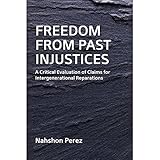Freedom from Past Injustices : A Critical Evaluation of Claims for Inter-Generational Reparations / Nahshon Perez.
Material type: TextPublisher: Edinburgh : Edinburgh University Press, [2022]Copyright date: ©2012Description: 1 online resource (200 p.)Content type:
TextPublisher: Edinburgh : Edinburgh University Press, [2022]Copyright date: ©2012Description: 1 online resource (200 p.)Content type: - 9780748649624
- 9780748649648
- 320
- KZ6785 .P47 2012
- KZ6785 .P47 2012
- online - DeGruyter
| Item type | Current library | Call number | URL | Status | Notes | Barcode | |
|---|---|---|---|---|---|---|---|
 eBook
eBook
|
Biblioteca "Angelicum" Pont. Univ. S.Tommaso d'Aquino Nuvola online | online - DeGruyter (Browse shelf(Opens below)) | Online access | Not for loan (Accesso limitato) | Accesso per gli utenti autorizzati / Access for authorized users | (dgr)9780748649648 |
Frontmatter -- Contents -- Analytical Table of Contents -- Acknowledgments -- Preface -- Introduction -- Chapter 1 Laying the Groundwork -- Chapter 2 Non-identity and Redressing Historical Injustices -- Chapter 3 Against Redress (1): The Individualistic Perspective -- Chapter 4 Against Redress (2): Thinking about Collectivities, States, and Nations -- Chapter 5 Intergenerational Redress and Forward-looking Considerations, and the Remaining Case for Redressing Past Wrongs -- Conclusion -- Notes -- Index
restricted access online access with authorization star
http://purl.org/coar/access_right/c_16ec
Should contemporary citizens provide material redress to right past wrongs?There is a widespread belief that contemporary citizens should take responsibility for rectifying past wrongs. Nahshon Perez challenges this view, questioning attempts to aggregate dead wrongdoers with living people, and examining ideas of intergenerational collective responsibility with great suspicion. He distinguishes sharply between those who are indeed unjustly enriched by past wrongs, and those who are not.Looking at issues such as the distinction between compensation and restitution, counterfactuals and the non-identity problem, Perez concludes that individuals have the right to a clean slate, and that almost all of the pro-intergenerational redress arguments are unconvincing.Key FeaturesUnique in claiming past wrongs should not be rectifiedAnalyses pro-intergenerational material redress argumentsCase studies include court cases from Australia, Northern Cyprus, the United States and Austria
Mode of access: Internet via World Wide Web.
In English.
Description based on online resource; title from PDF title page (publisher's Web site, viewed 29. Jun 2022)


